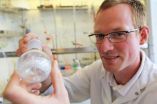(Press-News.org) The development of 'brain-like' computers has taken a major step forward today with the publication of research led by the University of Exeter.
Published in the journal Advanced Materials and funded by the Engineering and Physical Sciences Research Council, the study involved the first ever demonstration of simultaneous information processing and storage using phase-change materials. This new technique could revolutionise computing by making computers faster and more energy-efficient, as well as making them more closely resemble biological systems.
Computers currently deal with processing and memory separately, resulting in a speed and power 'bottleneck' caused by the need to continually move data around. This is totally unlike anything in biology, for example in human brains, where no real distinction is made between memory and computation. To perform these two functions simultaneously the University of Exeter research team used phase-change materials, a kind of semi-conductor that exhibits remarkable properties.
Their study demonstrates conclusively that phase-change materials can store and process information simultaneously. It also shows experimentally for the first time that they can perform general-purpose computing operations, such as addition, subtraction, multiplication and division. More strikingly perhaps it shows that phase-change materials can be used to make artificial neurons and synapses. This means that an artificial system made entirely from phase-change devices could potentially learn and process information in a similar way to our own brains.
Lead author Professor David Wright of the University of Exeter said: "Our findings have major implications for the development of entirely new forms of computing, including 'brain-like' computers. We have uncovered a technique for potentially developing new forms of 'brain-like' computer systems that could learn, adapt and change over time. This is something that researchers have been striving for over many years."
This study focused on the performance of a single phase-change cell. The next stage in Exeter's research will be to build systems of interconnected cells that can learn to perform simple tasks, such as identification of certain objects and patterns.
###
The University of Exeter is investing £230million in science and engineering across key themes, including Functional Materials.
The study can be accessed online: http://onlinelibrary.wiley.com/journal/10.1002/(ISSN)1521-4095/earlyview
The Engineering and Physical Sciences Research Council (EPSRC) is the UK's main agency for funding research in engineering and physical sciences. EPSRC invests around £800m a year in research and postgraduate training, to help the nation handle the next generation of technological change.
The areas covered range from information technology to structural engineering, and mathematics to materials science. This research forms the basis for future economic development in the UK and improvements for everyone's health, lifestyle and culture. EPSRC works alongside other Research Councils with responsibility for other areas of research. The Research Councils work collectively on issues of common concern via research Councils UK.
For further information:
Sarah Hoyle
Media Relations Manager
University of Exeter
+44 (0)1392 722062 / +44 (0)7827 309332
s.hoyle@exeter.ac.uk
Exeter study brings brain-like computing a step closer to reality
2011-06-24
ELSE PRESS RELEASES FROM THIS DATE:
Exeter study reveals US turtles' movements
2011-06-24
A University of Exeter team has monitored the movements of an entire sub-population of marine turtle for the first time. The study confirms that through satellite tracking we can closely observe the day-to-day lives of marine turtles, accurately predicting their migrations and helping direct conservation efforts.
Writing in the journal Diversity and Distributions, lead author and University of Exeter PhD student Dr Lucy Hawkes (now at Bangor University) describes the migrations of a population of loggerhead turtles in the US Atlantic Ocean over a decade (1998�). ...
iFund Lending Announces New $2 Million Lending Facility for Entrepreneurs
2011-06-24
iFund Lending is pleased to announce that it has made an additional $2 million available in its lending facility for western Canadian entrepreneurs and companies requiring a prudent financing alternative to banks, credit unions and other alternative lenders. iFund Lending provides entrepreneurs with business loans, bridge financing, franchise acquisition, purchase-order financing, debt consolidation, re-mortgages, SR&ED and receivables factoring, and other proven asset-based alternative methods of financing. Borrowers are able to access between $25,000 and $1 million, ...
'Language tests being misused' -- new study
2011-06-24
A seminal article on language testing, co-authored by Dr Glenn Fulcher, a Reader in Education at the University of Leicester, argues that some agencies are using unsuitable language tests to achieve policy ends.
Dr Fulcher, and Professor Fred Davidson of the University of Illinois Department of Linguistics, argue that generic tests are being used for multiple purposes because some policy makers go for "cheap and simple solutions" to complex problems, such as immigration.
Their article, entitled Test architecture, test retrofit, which has won this year's Best Paper ...
Tampa Swingers Announce Two Hotel Takeovers
2011-06-24
Swinglifestyle, the largest swingers site has teamed up to sponsor two hotel takeovers with Tampa Bay Escapes and Hedo Parties. The first event is Tampa Bay Escapes 3, which Tampa Swingers have scheduled for July 28-31,2011 (Thursday - Sunday).
Tampa Bay Escapes 3 is a 3 day / 3 night Complete Hotel Takeover and convention, with 15 Great Play Rooms & Hospitality Rooms, Libation Room every night courtesy of SwingLifeStyle.com. Prizes and Travel give-aways will also be included in the event. TBE has a Great line-up of entertainment and activities, plus TBE's signature ...
Chemist solves riddle of killer diseases
2011-06-24
Anthrax, septicemia and meningitis are some of the planet's most deadly infections. In part because doctors lack basic insights to prevent and cure diseases caused by so called Gram-positive bacteria. Now, a chemist from the University of Copenhagen has revealed the mechanism behind these deadly infections.
By creating a synthetic version of a Gram-positive bacterial endotoxin, Danish synthetic chemist Christian Marcus Pedersen has made a contribution that'll compel immune biologists to revise their textbooks. More importantly, he has paved the first steps of the way ...
Drug side effect linked with increased health risks for over 65s
2011-06-24
A side effect of many commonly used drugs appears to increase the risks of both cognitive impairment and death in older people, according to new research led by the University of East Anglia (UEA).
As part of the Medical Research Council's Cognitive Function and Ageing Studies (CFAS) project, the study is the first systematic investigation into the long term health impacts of 'anticholinergic activity' – a known potential side effect of many prescription and over the counter drugs which affects the brain by blocking a key neurotransmitter called acetylcholine. The findings ...
Youth cybercrime linked to friends' influence
2011-06-24
EAST LANSING, Mich. — Peer influence and low self-control appear to be the major factors fueling juvenile cybercrime such as computer hacking and online bullying, according to a new study led by a Michigan State University criminologist.
Thomas Holt, assistant professor of criminal justice, said the findings reinforce the need for parents to be more aware of their children's friends and Internet activities.
"It's important to know what your kids are doing when they're online and who they are associating with both online and offline," Holt said.
The study, which ...
Report presents best policy options to reduce petroleum use
2011-06-24
WASHINGTON — It will take more than tougher fuel economy standards for U.S. transportation to significantly cut its oil use over the next half century. It will likely require a combination of measures that foster consumer and supplier interest in vehicle fuel economy, alternative fuels, and a more efficient transportation system, says a new report from the National Research Council. Public interest in reducing the cost of securing the nation's energy supplies, curbing emissions of carbon dioxide and other greenhouse gases (GHGs), and improving transportation operations ...
Smartphone app helps you find friends in a crowd
2011-06-24
MINNEAPOLIS – Can a smartphone app enable meaningful, face-to-face conversation?
Engineers are trying to find out, with software that helps people locate their friends in a crowd – and make new friends who share similar interests.
The software, called eShadow, makes its debut at the IEEE International Conference on Distributed Computing Systems (ICDCS) on Thursday, June 23 in Minneapolis.
It uses nearby wireless networks and smartphones' wireless communication technologies to alert users that a friend who also uses the software is in the area – and gives directions ...
Lowering the color of crystals in sugar factories
2011-06-24
This release is available in Spanish.
Like diamonds, sugar crystals ideally are very pure and low in color. Now studies led by U.S. Department of Agriculture (USDA) chemist Gillian Eggleston have provided a better understanding of the source of undesirable color in factory sugar.
Eggleston works in the Agricultural Research Service (ARS) Commodity Utilization Research Unit in New Orleans, La. She conducted the studies with Barbara Muir of the Sugar Milling Research Institute in Durban, South Africa. ARS is USDA's chief intramural scientific research agency.
Environmental ...



